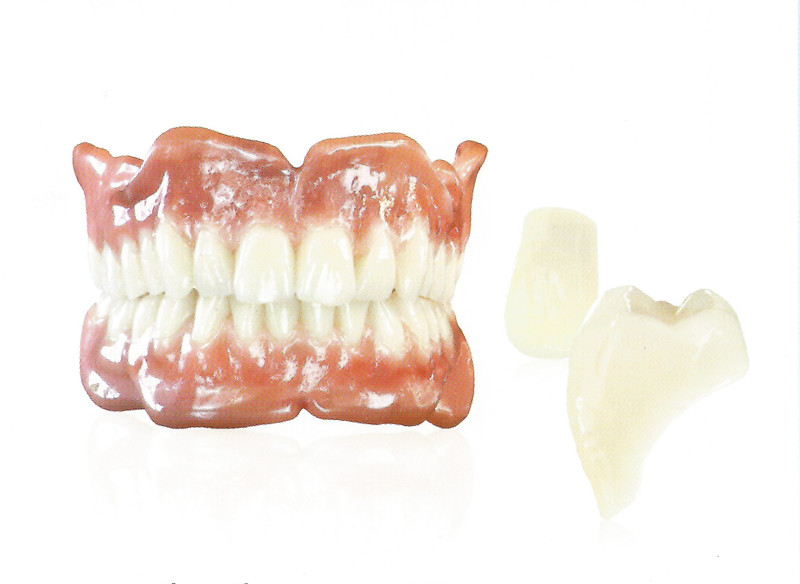These are false, removable teeth designed to replace missing teeth. Your dentist may recommend either complete (full) dentures or partial ones depending on how many natural teeth you may have lost.
Dentures can be created to match your existing teeth so that they will be inconspicuous. However, getting used to them can take a little time, particularly when it comes to speaking and chewing food.
The denture must be brushed daily just like your regular teeth. Your dentist will advise you on how to do this.
Complete dentures
These can be either ‘conventional’ or ‘immediate’. Before the fabrication of the denture the teeth have to be removed and the gum tissue must have begun to heal. A conventional denture will require around 8-12 weeks to be fitted into the mouth after the teeth have been removed.

Unlike conventional dentures, immediate ones are made in advance and can be placed as soon as the teeth are removed. So the wearer doesn’t have to wait till the gums heal to wear the prosthetic.
However, the bones and gum around the extracted teeth may shrink over time during the healing period.
This is a disadvantage of immediate dentures over conventional ones as more adjustments will be required until the bones and gum heals completely.
So it is best to consider immediate dentures as a temporary measure until the conventional one is made and ready to be worn.
Partial dentures
A partial denture or bridge consists of replacement teeth which are attached to a pink or gum-colored plastic base which may be connected by a metal framework that keeps the denture in place in the mouth.

These are used to replace lost teeth in the upper or lower dental arch.
A fixed bridge is a prosthetic replacement of one or more missing teeth; it is attached by placing crowns on to the teeth adjacent to the space and then cementing the artificial teeth into place.
So the fixed bridge helps keep the teeth, adjacent to the empty sockets, from changing their natural position.
A precision, partial denture is detachable and consists of internal attachments instead of clasps that attach to the adjacent crown. This prosthetic has a more natural look than the fixed bridge type.
Alternatives to dentures
Dental implants can be used to support the cemented bridges thereby eliminating the need for a denture. It is not cost effective though, but the implants together with the bridges closely resemble the look and feel of natural teeth.
Dental implants are being preferred over dentures but not everyone is an eligible candidate for implants.
Seek the advice of your dentist to see what type of dental prosthetic will suit you best.
How are dentures made?
It will generally take a number of weeks and several visits to the dentist before your denture is ready for wear. Once your dentist decides the best type of prosthetic for you, the following manufacturing process will take place:
- A dental technician will make a series of impressions of your jaw, measurements of how the jaws relate to each other and the space between them.
- These measurements will be used to create models, wax forms and plastic patterns of the shape and position of the denture to be made.
- Once this initial model is made you will be called in for several ‘fittings’. Once that is determined the color and shape will be assessed and the final denture will be cast.
- Once this cast is made, final adjustments will be done for maximum comfort of the wearer. Now it’s ready to be used.

What do new dentures feel like?
Initially it will feel odd and loose the first few weeks, as is the case with any new prosthetic, until the cheek muscles and tongue adjust accordingly and you get used to inserting and removing it easily.
Some wearers may experience minor irritation and soreness at first, and the flow of saliva will increase but these issues will resolve as your mouth adjusts to the denture in due time.
Will dentures make me look different?
Since dentures are created to resemble your natural teeth to its precise features you can expect only a few minute changes in appearance between them, hence there won’t be a drastic change in your facial features. However, they can help improve your smile and fill out the gaps left by your missing teeth.
Will eating with new dentures be difficult?
Initially it will be a little uncomfortable the first few weeks, till the wearer gets used to the prosthetic.
You can start practicing with soft food cut into little pieces, chew slowly using either side of your mouth until your denture becomes comfortable shift to food with different textures until you are confident to return to your regular diet. Take caution when consuming food with sharp edged bones or shells, hot, hard or sticky food. Avoid chewing gum and using toothpicks while wearing the denture.
Will dentures affect how I speak?
The wearer may face some difficulty in pronouncing certain words, so it’s best to start by saying those words out loud. With time and practice you will become comfortable in speaking with the prosthetic on.
If the denture makes a ‘click’ while you are talking, or occasionally slip while laughing or coughing, then contact your dentist as you may need minor adjustments and repositioning. This can be done by biting down and swallowing.
Can dentures be worn 24 hours a day?
Your dentist or prosthodontist will advise you on the number of hours you should be wearing the denture.
Initially he may advise you to wear it all the time for several days including while you sleep. Though this may be uncomfortable, it is the fastest way to identify the areas that require adjustments. Once this is done and the necessary adjustments are made, you are to remove the denture before going to sleep. This will allow the gum to rest and normal stimulation by the tongue and saliva to occur.


